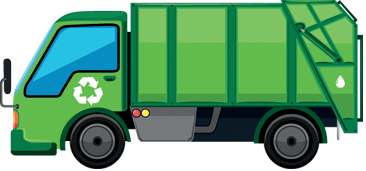At the moment, the waste management and recycling industries are considered to be some of the most dangerous to work in. To an extent this also includes domestic and commercial rubbish removal procedures, though the particular research focuses mainly on industry segments after waste collection stage.
In period twenty thirteen – twenty fourteen, the UK’s waste management and recycling industries have proven to be amongst the most dangerous fields to work in. This particular segment of the economy accounts for about half a percent of employment in Great Britain. One the same note, two point six percent of all work related injuries in the same period are reported to have occurred in the waste management and recycling industry.
 In the period twenty thirteen – twenty fourteen, official figures show that there were four fatal accidents reported in the waste management industry in comparison to an average of nine such unfortunate events over the previous five year period. Also, there was one fatal injury to member of the public as compared to an average of two such tragic events per year, over the previous five year period.
In the period twenty thirteen – twenty fourteen, official figures show that there were four fatal accidents reported in the waste management industry in comparison to an average of nine such unfortunate events over the previous five year period. Also, there was one fatal injury to member of the public as compared to an average of two such tragic events per year, over the previous five year period.
The waste management and recycling industry is marching forward in terms of efficiency and ingenuity, but it seems there is still a long way to go in terms of safety. In the five year period between two thousand nine and two thousand fourteen, three out of ten fatal accidents were caused by vehicles hitting workers at waste treatment and processing sites. Furthermore, four out of ten specifically reported injuries were caused by trips and slips at waste processing sites / depots.
Unfortunately such tragic events do happen even in multi billion pound segments of the economy like the UK’s waste management industry. To show how big the industry really is, here is a perspective – the UK generates nearly two hundred and thirty million tonnes of waste annually, it is estimated that there are about hundred and sixty thousand people engaged in waste management and recycling in the UK alone.
More extensive training is perhaps one of the departments where improvements are needed. The waste management and recycling industry in itself is a dangerous workplace. Workers come in contact with different materials and substances, some of them hazardous on a daily basis. They also operate heavy, large sized equipment and machinery which can cause lifelong disability and potentially fatal injuries.
Watchdog organisations and industry specialists put emphasis on adequate employee training. Staff must be trained to recognise and avoid potential risks and hazards in the course of everyday duties. The same applies to using heavy equipment and machinery. Onsite traffic is another big issue as large vehicles with limited driver visibility are amongst the biggest threats to waste management workers. Poor weather conditions are also a big problem for worker safety when rubbish removal vehicles are collecting and dumping waste.
It is expected that health and safety regulations and standards will be reviewed and further developed as well as improved by UK authorities in the upcoming months. The new rules will apply to all waste management and recycling industry participants.

